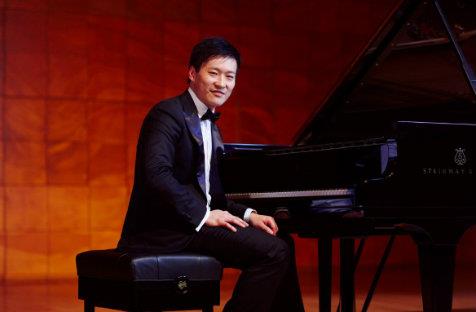The transition from the Russian Festival with the Melbourne Symphony Orchestra in Hamer Hall on the previous evening, when Natsuko Yoshimoto acted as concertmaster and Li-Wei Qin featured as soloist for Tchaikovsky’s Rococo Variations on a Rococo Theme, to the intimacy of a trio recital in the Elisabeth Murdoch Hall on Sunday afternoon made for an interesting comparison. With Kristian Chong at the keyboard, the trio chose two contrasting mainstays of the piano trio repertoire: the Piano Trio No 2 by Shostakovich and Mendelssohn’s Piano Trio No.1.
Although all three are experienced chamber music players in their own right, their experience as a trio in this conformation is limited. Nevertheless, such is the technical facility and depth of musical understanding of each player that they were able to combine their resources to create what proved to be a most enjoyable recital.
Li-Wei Qin appears to be equally at home as a soloist with orchestra, projecting his sound in a big concert hall, as he is fashioning it to collaborate with just two other instruments in a much smaller venue. The Shostakovich trio is a marvel in its evocation of extremes in emotion and it was a pity that the soft, unearthly harmonics of the opening theme, played with such sensitivity by Qin, were interrupted by the voices of children of an overly optimistic family. After a speedy exit by said family, the audience was left to enjoy some exceptional playing.
Qin’s cello is particularly mellow and his highly developed musical imagination enables him to shape a phrase to telling effect. The gentle mournful Largo provided, for me, the most emotionally arresting moment of the concert. The trio was written in remembrance of Shostakovich’s close friend, Ivan Sollertinsky, who had recently died of a heart attack and Qin’s hauntingly beautiful playing gave eloquent voice to this lament. Yoshimoto’s voice was at its warmer toned best as the lines exchanged and intermingled against Chong’s meditative chord progressions in the form of a chaconne. Yoshimoto’s preference for a bright, almost strident tone when playing at full volume on the uppermost string was well suited to the bitter, biting passages of the second movement and the frenzied climaxes of the final movement of Shostakovich’s work.
This characteristic was less appropriate for the Mendelssohn trio, which is infused with open-hearted melodic abundance and emotional warmth. Again, Qin’s capacity to express great depth of feeling informed the ‘big tune’ of the first movement and the ultra Romantic moments of the Andante con moto tranquillo of the second movement. The Romantic passion was all there without becoming over-blown or saccharine. For his part, Kristian Chong captured the effervescence of the Scherzo beautifully. Whilst the hall tends to favour the piano and amplify the bass notes, sometimes muddying the texture, Chong’s rippling, surging playing made a notable contribution towards creating a sense of unified rhythmic drive throughout the work.
An appreciative audience had the opportunity of hearing this formidably talented trio mine a completely different vein in an encore. Stylishly played, a piano trio version of Astor Piazzolla’s ‘Winter’ from The Four Seasons of Buenos Aires provided a fitting conclusion to a Melbourne concert in Winter.
Rating: 4 stars out of 5
Natsuko Yoshimoto, Li-Wei Qin & Kristian Chong play Trios
Natsuko Yoshimoto, violin
Li-Wei Qin, cello
Kristian Chong, piano
SHOSTAKOVICH: Piano Trio No. 2 Opus 67 in E minor
MENDELSSOHN: Piano Trio No.1 Opus 49 in D minor
Elisabeth Murdoch Hall, Melbourne Recital Centre
11 August
(Pictured: Pianist Christian Chong)





